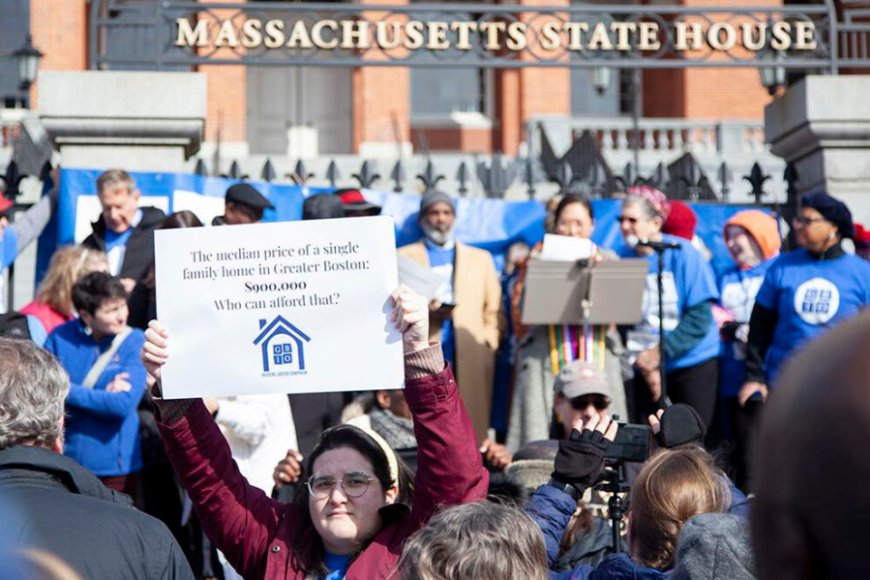Tough-to-get rent vouchers popular with tenants, landlords

BOSTON (SHNS) - Both tenants and landlords reported significant satisfaction with a state-run voucher program designed to help low-income residents pay rent, even as they continue to flag difficulties with navigating the system, according to a new report.
The MassINC Polling Group and The Boston Foundation on Wednesday published a 56-page report about the Massachusetts Rental Voucher Program, combining broader surveys with more detailed interviews involving residents who use the safety-net program.
Seven in 10 landlords said they are somewhat or very satisfied with the program, praising it for guaranteeing consistent rent payments, allowing them to make positive community impacts and reducing tenant turnover.
Among renters, many described experiencing significant benefits. Eighty-six percent agreed that their children are performing better in school because they have stable housing, and 78% said it's easier to keep a job with housing secured.
"The Massachusetts Rental Voucher Program enables thousands of families to put down roots in our community and access a safe and stable home that provides a foundation for them to thrive in school and work," Sarah Bartley, senior vice president of safe and stable housing at United Way of Massachusetts Bay, said in a statement provided alongside the report. "This report demonstrates how we all win when families are able to realize their goals by maintaining employment, saving more, and building credit."
Still, analysts said many MRVP participants continue to experience obstacles. Forty-five percent of renters who were deemed eligible for the program said it took more than a year to receive a rental voucher after they first applied. About a third said it took them four months or longer after receiving a voucher to find an apartment.
Roughly one-quarter of tenants said they were treated unfairly in the process of using their voucher. One tenant surveyed reported waiting for hours on the phone to get recertified.
"We have to sit on hold for like five hours. Then the call will get disconnected," the tenant said, per the report. "Once you get to number one, you have to sit on hold for another three hours."
Report authors called on Beacon Hill to codify MRVP into statute, instead of keeping it as a single line item renewed in the annual state budget, and to expand the number of vouchers available.
Households that make less than 80% of the area median income where they live are eligible to apply for MRVP vouchers. Demand for vouchers far exceeds the supply. The program serves 10,700 low-income households, who typically pay 30% of their gross income for rent and receive a voucher for the remainder, according to the Boston Foundation, but the waitlist to get on the program was recently estimated at 160,000 and the new report pegged it at 168,000 as of February.
Policymakers face regular calls for more action to address a statewide lack of affordable, available housing that puts pressure on residents across the income spectrum.
In their fiscal 2026 budget proposals, Gov. Maura Healey and the Senate Ways and Means Committee each moved to increase funding for MRVP from $219 million to $253 million. The House-approved budget would go a bit further and bump the program up to $258 million.
Healy administration officials have estimated that a $253 million appropriation could support a bit more than 11,000 vouchers, citing increases in rents as a constraining factor.
"Across the Commonwealth, the intensifying housing affordability crisis is disproportionately affecting low-income Latinx and immigrant communities, especially our most vulnerable residents in places like Chelsea," said La Colaborativa Chief Operating Officer Alex Train. "MRVP, a major tool in combating the affordability crisis, is a notably effective program, as outlined in this thorough report. We emphatically urge the Commonwealth to codify and expand MRVP, in order to make housing stability a reality for all families in our Commonwealth."
Other report recommendations included better communication with tenants and landlords, state investment in outreach and education about the program, and efforts to tackle the so-called cliff effect, which refers to when a voucher-holder becomes ineligible after an increase in income pushes them above the allowable threshold.
The survey, conducted in early December, involved 989 tenants with vouchers through the program and 175 landlords who rent to voucher-holders. Authors also held two focus groups with MRVP tenants and 11 landlord interviews in February.
Local News Headlines
WWLP-22News, an NBC affiliate, began broadcasting in March 1953 to provide local news, network, syndicated, and local programming to western Massachusetts. Watch the 22News Digital Edition weekdays at 4 p.m. on WWLP.com.
What's Your Reaction?
 Like
0
Like
0
 Dislike
0
Dislike
0
 Love
0
Love
0
 Funny
0
Funny
0
 Angry
0
Angry
0
 Sad
0
Sad
0
 Wow
0
Wow
0





































